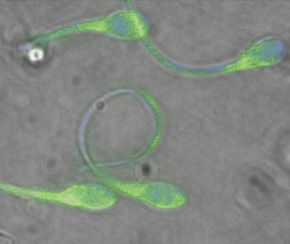Home Page
The latest articles, features and news.


Read About...


Search Articles



|
| | |
|
25 July 2011
Sperm coat protein loss may explain bulk of male infertility
by George Atkinson  The loss of a protein that usually coats sperm may explain a significant proportion of infertility in men worldwide; explain an international team of researchers in the journal Science Translational Medicine.
The loss of a protein that usually coats sperm may explain a significant proportion of infertility in men worldwide; explain an international team of researchers in the journal Science Translational Medicine. Senior researcher Gary Cherr, from the University of California - Davis, says that the protein - DEFB126 - acts as a "Klingon cloaking device," allowing sperm to swim through mucus and avoid the immune system in order to reach the egg. But many men carry a defective gene for DEFB126 according to sperm samples from the U.S., United Kingdom and China. The samples showed that as many as a quarter of men worldwide carry two copies of the defective gene - which may significantly affect their fertility. One of the mysteries of human fertility is that sperm quality and quantity seem to have little to do with whether or not a man is fertile. "In 70 percent of men, you can't explain their infertility on the basis of sperm count and quality," Cherr explained. Sperm from men with the defective DEFB126 genes look normal and swim around like normal sperm. But they are far less able to swim through an artificial gel made to resemble human cervical mucus. However, when the normal protein is added to the sperm, they recover their normal abilities, the researchers found.
Worldwide, about half of all men carry one defective copy of the gene; a quarter have two defective copies and therefore make sperm that are poor at swimming through mucus. The researchers want to understand why a mutation that affects male fertility be so astonishingly common. They speculate that it may be that heterozygotes - men with one normal and one defective gene, but normal fertility - are advantaged in some other way. "It's possible that because humans, unlike most mammals, breed in long-term monogamous relationships, sperm quality just does not matter very much," Cherr said. However, some researchers believe that, for reasons unknown, human male fertility has been falling worldwide in recent decades. That decline might be unmasking the problems associated with the defective DEFB126 gene. Related:
Fertility problems blamed on evolution
More evidence linking water pollution to sub-fertility
Changes To Sperm DNA Could Be Cause Of Most Male Infertility
New Evidence For Environmental Chemicals Damaging Sperm
Source: University of California - Davis
|
|

